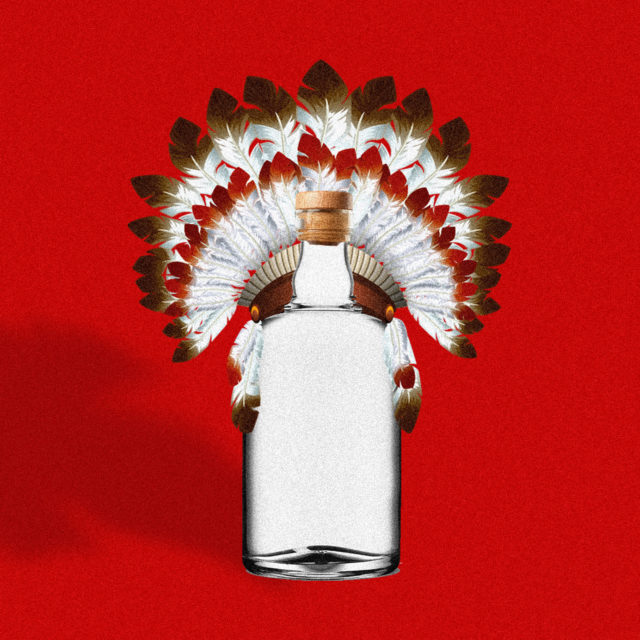Never mind what your peacekeeping bartender says: Politics do have a place in the bar.
Economics, social mores, and centuries-old traditions all come together in the glass. After all, rum is inextricably tied to the Caribbean, and mezcal and tequila to Mexico. If European trade routes hadn’t existed, fortified wines probably wouldn’t, either.
As people and societies evolve, ownership of a certain style or category sometimes falls into a gray area. Tiki, for example, began as a post-war, white American fantasia of transpacific cultures. Today its themes straddle inspiration, homage, and appropriation, depending on whom you ask.
Things get especially complicated when business owners profit from the history or culture of communities to which they don’t belong. The dynamics change when brands are backed by people of privileged demographics, and their products feature the culture of marginalized people.
Here, we examine a few cases where things got sticky — and others where spirits pros absolutely got it right.
Apache Gin
Four white Belgian guys walk into an Albuquerque bar, have a few drinks with some Native American folks, and then, almost a decade later, back in Belgium, decide to launch a liquor brand inspired by that experience. They name it Apache Gin.
Zero actual Native American people were involved in Apache’s inception, and the gin does not benefit any Native American tribes or organizations. Marketing efforts have included things like a now-deleted Instagram post of themselves dressed in headdresses. (Luckily, we kept the receipt.)
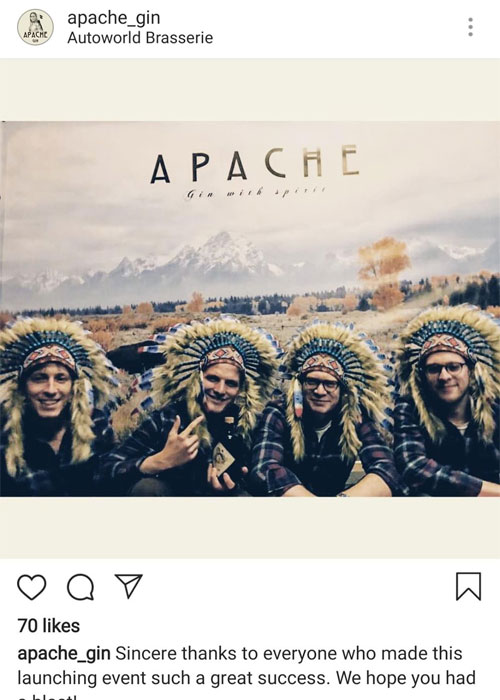
Once the U.S. bar community got wind of Apache Gin and its blatant appropriation of Native American culture, numerous people attempted to call them out via various channels (Instagram comments, emails, and the like). They were met with radio silence at best; others were blocked.
It’s one thing for a brand or business to commit this kind of offense, but it’s another when they refuse to listen to the people who actually feel the effect of their actions. This sort of behavior can be deeply harmful to marginalized communities.
When I reached out to the Apache Gin team for comment on this story, I received this response:
“Our product is not actively promoted, has no sales points and you can even not ask on our webshop to have our bottle shopped [sic] to the USA. So we deem we don’t hurt anyone, as in our homemarket [sic] similar feelings about using such branding don’t exist.
“The only way our brand is going to create damage is if you and your friends continue making a [hurricane] in a glass of water. (=> if you stop speaking about Apache Gin in the USA, no Apache tribe member will get hurt)
“Kind regards, Thomas Van Acker”
Does Apache Gin comprehend their wrongdoing? Unclear. Do they care? Definitely not. (Are they really good at gaslighting? Yep.).
“Indigenous culture in not just a name, a piece of jewelry, or a feather,” says Morgan Crisp, president and co-owner of Seven Clans Brewing, a majority-female indigenous-owned company in Cherokee, N.C. “What you see on the outside is just that: an exoskeleton. Beneath lies all the good stuff — values, spirituality, stewardship, history, community — that shape the exterior symbols that many non-native people today recognize as ‘Native.’
“When used inappropriately, it simply de-values our culture and the people of that culture. Brands that appropriate culture in this fashion today seem to either lack understanding and/or compassion,” she adds.
So, how should the guys behind Apache Gin have handled this sort of situation — aside from just not launching a blatantly insensitive brand in the first place?
“The least they can do is listen,” Crisp says. “A favorable response hinges on their ability to understand why their branding has a negative impact. I don’t think it’s appropriate for a brand to profit off of a marginalized culture without the person(s) represented in that culture having ownership or being compensated.”
Copalli Rum
Rum is not exactly synonymous with Belize, but Copal Tree Lodge, a luxury eco-resort in Punta Gorda, recently partnered with a distillery to make Copalli Rum.
At first glance, someone with a culturally sensitive lens might raise an eyebrow at a five-star, primarily white-owned hospitality business operating in a small, Central American country with staggeringly high unemployment and poverty rates. This, however, is a case of a company doing its best to benefit its local community.
The Copalli Rum distillery is a zero-impact operation. Its two certified-organic, single-estate rums are made from sugarcane, canopy water, and yeast sourced from the Copal Tree’s own rainforest farm in southern Belize. The distillation process is “powered by sustainable, regenerative biomass and supports full-circle conversion of waste from production into agricultural inputs,” according to a brand representative.
Moreover, Copal Tree Lodge has a 22,000-acre rainforest conservancy that has promoted both preservation of the land as well as marine conservation programs over the past 20 years. The company as a whole has become the largest employer in southern Belize.
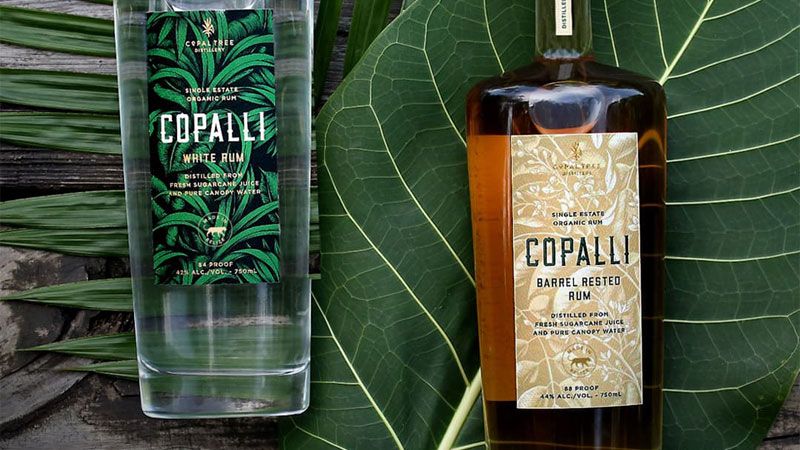
It doesn’t stop there. Copal Tree Distillery president and master distiller Ed Tiedge notes that, in Belize, free public education ends at 8th grade. Those below the poverty line (approximately 43 percent of the population) are often unable to continue their education beyond that point and, for societal reasons, young girls tend to be especially affected by this.
As of 2019, Copal Tree started to “provide educational grants for these local children [particularly girls] to continue their education into high school,” Tiedge says.
It’s too early to see results from this particular program as it’s currently in its early stages of implementation, but the intention is there at the very least. We’re eager to watch this progress, and hopefully offer an example to other internationally owned tourism and hospitality companies.
GEM & BOLT
Not all cultural appropriation is as obvious as that of Apache Gin. Others, like GEM & BOLT mezcal, are dangerously vague.
The company website is a mystery wrapped in intentionally enigmatic marketing language. It describes its two white founders, “artist-alchemist duo Adrinadrina and Elliott Coon,” as “daughters of bohemian-bootleggers” from the mountains of Virginia. Abstract tag lines include such chestnuts as “life is an altar,” “it’s all theatre,” and “energy is immortal.”
Imagery is similarly head-scratching. An image on one tab, “The Altar,” features a white woman running naked through an agave field. Various videos and photos across the site show white people in headdresses, candy skull face paint, and whole wolf skins.
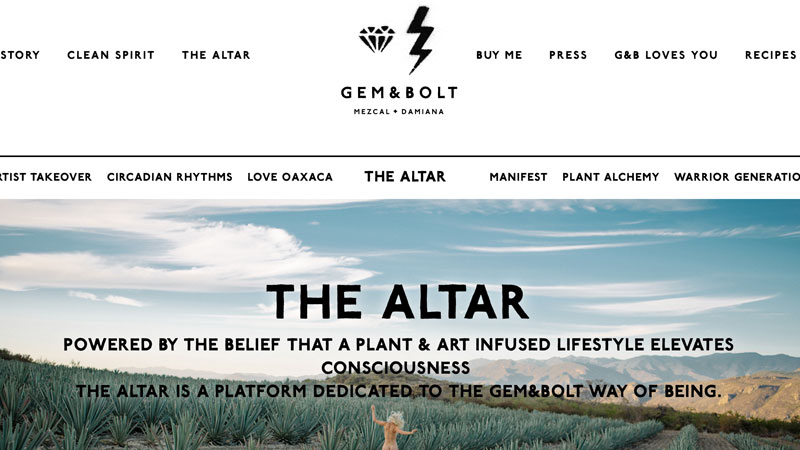
What makes this extra uncomfortable is that GEM & BOLT doesn’t immediately seem inclusive of the culture upon which it’s built a brand and revenue stream. It claims to be a “clean spirit,” which means… nothing, actually, but is disturbingly reminiscent of other culturally insensitive brands. Is the implication here that other agave spirits, distilled by people in Mexico for centuries, are dirty? This smacks of white saviorism. It spins the use of “fair-trade, organic and sustainable agave” into a better-for-your-body storyline, denigrating the culture it’s claimed in the process.
The company website also claims to employ a “fourth-generation master distiller in Oaxaca.” At the time of this article’s publication, he is not named or pictured anywhere on the site. Why is such a key player not given representation, while its two white founders are endlessly promoted on the site and to the press? (Upon further digging elsewhere on the internet, I found his name. It’s Ignacio Martinez.)
While researching this article I emailed GEM & BOLT to request comment and get some clarity about the brand’s practices and intentions. I also asked about a tab I had seen on GEM & BOLT’s website, titled “Warrior Generation.” It alluded to a plan to develop programming designed to give back to the community in some way. That tab has since morphed into another*, and my request for comment went unanswered. What does this tell us about this company, its two white women founders, and their accountability?
Sombra Mezcal
A perfect comparison to the GEM & BOLT case is Sombra Mezcal, founded in 2006 by winemaker and Master Sommelier Richard Betts with director general John Sean Fagan. The two were determined to create an ecologically sustainable brand that benefits the local indigenous population.
The distillery’s construction was overseen by civil engineer and Oaxaca native Martha Cardoso, and the juice is distilled by José Pablo Raña Zorrilla of Mexico City. (As with GEM & BOLT, neither of these individuals are anywhere to be found on the website, but, in this case, no members of the team are featured online.)
Sombra’s production incorporates a number of sustainability-minded processes, such as collecting and repurposing rainwater, composting spent materials for local farmers, and deriving energy from solar panels. Byproducts are upcycled into adobe bricks used to build houses for families affected by earthquakes in Oaxaca’s Sierra Mixe district, and to rebuild a graveyard wall. Sombra is also a member of 1% for the Planet, through which it donates 1 percent of its sales to local environmental charities and educational initiatives in Oaxaca. According to an article by Munchies’ Dan Q. Dao, 77 percent of the company’s employees are indigenous.
Its recent, limited-edition Ensamble mezcal was made of rare agaves Tepeztate and Tobalá (the latter is particularly precious). To make up for the 673 mature Tobalá plants that Sombra harvested, the company planted 20,000 in their place; they will be replanted in the wild after two years of maturation. Sombra Mezcal is an excellent example of what it means to launch a culturally sensitive brand, and to give back significantly more than what it takes.
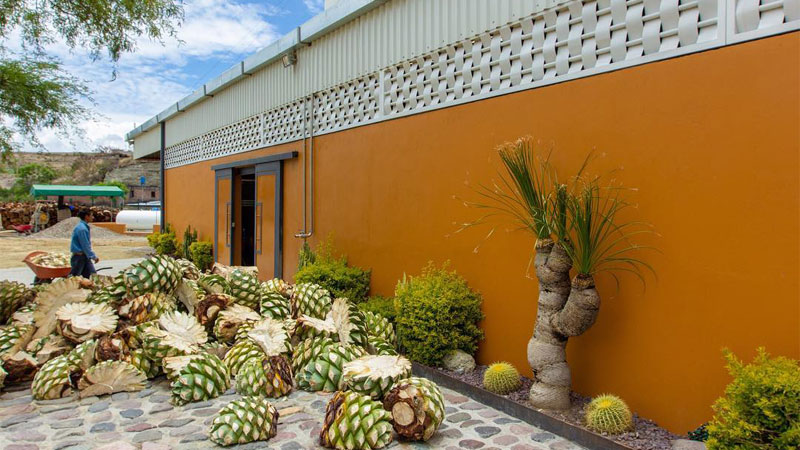
When the Community Speaks, The Industry Should Listen
Could companies like GEM & BOLT learn from Sombra? (Certainly, but will they?) And what will it take for the Apache Gins of the world to change?
“A brand called out for this kind of behavior has really only one choice: involve someone from the culture they’ve appropriated on an equity level, or completely rebrand,” says Jackie Summers, entrepreneur, published author, creator of Sorel Liqueur, and liquor-industry advocate. “And if they really want to honor culture, actually provide financial backing to people from a culture to lift their own brands to the forefront.”
The examples we’ve explored in this story represent a mere fraction of the bigger picture. Offenses are offenses, whether they are subtle microaggressions of the “clean spirit” variety, or blatant disregard for those who express discomfort with culturally insensitive branding. And there are myriad blueprints for brands that aim to honor and, in the best cases, actively benefit the cultures they claim.
If we as consumers know what to look out for, and call out offenders when we see them, perhaps we can collectively begin to level the playing field — and, ultimately, make the industry a better place for all.
* Upon the publication of this article, GEM & BOLT (finally) contacted this writer to share information about the company’s approach to giving back to the local community. A brand representative sent a blog post I had not seen before (it does not contain a publish date) that details GEM & BOLT’s commitment to fair trade practices and partnerships with growers and producers, namely one with their distiller, fourth generation maestro mezcalero Ignacio Martinez, and his family. It also discusses the Agave Plantation Program created by their Director of Operations Vicente Reyes under Proyecto Hermano Maguey, and now shares the story of the Martinez family.
The lesson here is that a brand may want to do its local community, economy, and people justice, but it is imperative to maintain communication around these initiatives with care and transparency. Brands have to be consistently fair in who gets promoted — and why. Abstract marketing trivializes very real people and their very hard work.
